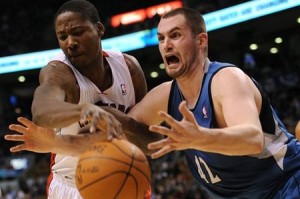The 2010-11 Minnesota Timberwolves season was a struggle. But what went wrong?
In a word, everything, but that would be too easy.
Kevin Love’s 53 game double-double streak overshadowed what was a season full of over blown expectations and vast under achievement.
In watching Wolves’ President David Kahn give essentially his State of The Timberwolves address, one would’ve left assuming the team was an offensive juggernaut that struggled immensely to defend.
Only the latter is correct.
The Wolves did rank 10th in the NBA in scoring (101.1), but that number is actually rather skewed in determining their actual offensive success.
Their Pace—or possessions per game—ranked first in the NBA at 99.2. Now I’m no mathematician, but if you average the most possessions in a game, and only rank tenth in scoring, something just isn’t right.
And ESPN’s John Hollinger’s offensive efficiency ratings would support such an obvious hypothesis. According to Hollinger, the Wolves ranked 24th in offensive efficiency.
While Kahn depicted to the Minnesota fans that defense needs to get better, it’s obvious that they have gaping holes offensively.
Sure Kevin Love and Michael Beasley had breakout years, but two poor defensive, high-scoring forwards can only get you so far.
Luke Ridnour was solid, but as a starting point guard in this league 11.8 points and 5.4 assists per game isn’t putting fear in your opponents.
Jonny Flynn showed signs of a pulse in a few, rare occasions, but his play was on par with most point guards in the D-League.
Center Darko Milicic was serviceable at center, a position that has dropped off league wide. But the signing of Nikola Pekovic to a four-year 13 million dollar contract was in a word, asinine.
Whenever you can overpay for the exact same center that you already have, except the less athletic, less-long, less-skilled version, you have to do it.
(Pekovic is still on the books for three more years. I’m a fan of giving guys second chances, but Kahn is doing Pekovic a disservice by keeping him employed by the Timberwolves. He would be much better suited as a bouncer at a strip club or in a high-stakes poker room. I mean come on, he is eerily similar to every one of Jack Nicholson’s men in The Departed.)
Rookie Wes Johnson was disappointing, but his play was on par with his rookie class. The only problem is Johnson is 23 years old, which leads me to believe his game may not have much more room for improvement. Averaging only 9.0 points per game this year could mean his ceiling is only a 12-13 point per night guy.
Flat out the Wolves didn’t have a wing scorer who they could turn to in need of a bucket. Beasley was effective, but most of his scoring came from the high post. Martell Webster proved to be a viable bench option, but it became clear as the season went on that he is not a starter type in this league. And the undersized Wayne Ellington proved that he can play at this level, but only as a three-point specialist off of the bench.
Basketball is pretty simple, when you can’t score from the perimeter, it becomes tough to score inside. And that was seen often this season.
Defensively the Wolves were slower than their opponents at every position.
They ranked last in the NBA in points allowed per game at 107.7. But with their offensive pace being top in the league, one would assume that their defensive efficiency would drop according. Not so much.
According to Hollinger, the Wolves defensive efficiency ranked 27th in the league.
Love, one of the best defensive rebounders in the league, struggled mightily at guarding other power forwards. He wasn’t athletic enough to get out to stretch 4’s, nor was he physical enough to bang on the block with more traditional power forwards.
Elite point guards ate up the Wolves, but so did the George Hill’s of the league.
If point guards can routinely beat their defender off the dribble and get into the teeth of the defense, then it becomes impossible to defend. And that is what Ridnour, Flynn, and even Sebastian Telfair allowed opponents to do.
Going from 15 wins in the 2009-10 season, to 17 wins this season is technically improvement. But it’s not the improvement that was expected after the off-season signing of Ridnour and the assumed improvement that Flynn would have in year two.
The Wolves need a lot of help next year, but most importantly at the point guard position.
-Brett Cloutier
Brett is a contributor to The Sports Bank as beat writer for the Minnesota Timberwolves and Minnesota Gopher hockey. He is also the co-host of “The Backdoor Cut,” a Minneapolis based sports and pop culture radio show.
You can also follow Brett on Twitter @brettcloutier

